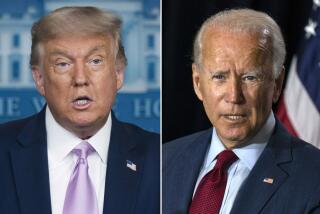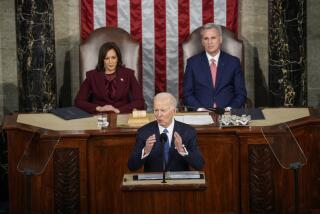Lawmakers get a fresh start on immigration overhaul
- Share via
WASHINGTON — President Bush is committed to working with Congress on an overhaul of immigration laws, two Cabinet officials told a Senate panel Wednesday, but they hedged on the contentious issue of whether people who come to the U.S. illegally should have a path to citizenship.
The administration’s priority is to secure the nation’s borders and convince the estimated 12 million illegal immigrants to “come out of the shadows,” Commerce Secretary Carlos M. Gutierrez told the Senate Judiciary Committee.
“I’m not sure that everyone wants to be a U.S. citizen. Many just want to be able to work, and if they can work legally, one day they would like to go back home,” he said. “So I don’t think that citizenship is what will make them come out of the shadows.”
In the first hearing on immigration policy since the Democrats took over Congress, Homeland Security Secretary Michael Chertoff emphasized that any changes in the law should not amount to amnesty.
“We cannot give those who are here illegally because they’ve broken the law a leg up and an advantage over those who have played by the rules,” he said.
Many Republicans, particularly in the House, broke with Bush last year over his support for what the White House has called “comprehensive immigration reform.”
“I don’t believe that House Republicans would support a bill that creates a path to citizenship for people who came to the country illegally,” said Amos Snead, a spokesman for House Minority Whip Roy Blunt (R-Mo.).
In his testimony, Chertoff emphasized the need for tighter border security and tougher workplace enforcement measures. Praising a workplace crackdown last week in California and 16 other states, he said harsher penalties were needed to prevent workers from entering the country illegally.
But under questioning by committee Chairman Patrick J. Leahy (D-Vt.), Chertoff and Gutierrez conceded that, for the most part, illegal workers were not taking jobs away from Americans. Asked about the likelihood of rounding up everyone here illegally, Chertoff acknowledged that “it would be a gargantuan task to try to locate, detain and deport 12 million people.”
The hearing follows a renewed behind-the-scenes push by the White House to get a comprehensive overhaul passed before 2008 presidential and congressional campaigning swings into high gear. At least in broad terms, Bush agrees with congressional Democrats that the immigration laws -- last revised on a large scale in 1986 -- need significant retooling.
Last year, the Senate, then under GOP control, approved legislation that hewed closely to Bush’s proposals. The bill, passed by a vote of 62 to 36, would have given many illegal immigrants a chance to pursue citizenship, created a guest worker program, tightened sanctions on companies employing illegal workers and authorized hundreds of miles of fencing along the U.S.-Mexico border.
But the House refused to consider anything beyond a tight focus on border security and enforcement, dooming the wider approach.
Sens. Edward M. Kennedy (D-Mass.) and John McCain (R-Ariz.), who drafted last year’s bill, plan to introduce a new version soon. Reps. Jeff Flake (R-Ariz.) and Luis V. Gutierrez (D-Ill.) are working on similar legislation on the House side. Flake said in a written statement that the issue offered a rare chance for the president and Congress “to come together and enact meaningful, substantive legislation.”
“Republicans as a whole aren’t that much different than Democrats as a whole -- they want some type of comprehensive reform,” he said in a telephone interview.
Not everyone is on the same page, however. Sen. Dianne Feinstein (D-Calif.) suggested during Wednesday’s hearing that senators “may have reached too far in the comprehensive bill” last year and would be better off tackling the issue piece by piece.
Leahy warned that whatever the approach, the road ahead wouldn’t be easy.
“This is going to be a long process,” he said. “The most important point in this whole thing is where the president is going to be, and where he’s going to be publicly on this.”
*
More to Read
Get the L.A. Times Politics newsletter
Deeply reported insights into legislation, politics and policy from Sacramento, Washington and beyond. In your inbox twice per week.
You may occasionally receive promotional content from the Los Angeles Times.










